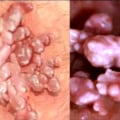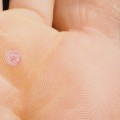Genital warts, caused by the human papillomavirus (HPV), are a common sexually transmitted infection. While there is no cure for the virus, the body can often get rid of the warts on its own. In some cases, however, a health professional may need to intervene with treatments such as topical creams or surgery. It's important to note that these treatments can weaken condoms and diaphragms, so it's best to avoid sexual contact while the cream is on the skin.
Genital warts usually appear as flesh-colored lesions on the external genitalia, including the penis, vulva, scrotum, perineum, and perianal skin. Chemical treatments are more effective on wet, soft, non-keratinized warts in the genital area; keratinized lesions respond better to physical ablative treatments. Laser treatment may be useful in HIV-infected patients who have very large external genital warts or severe local symptoms. For women, it's important to have regular pelvic exams and Pap tests to detect any changes caused by genital warts or early signs of cervical cancer. Surgery may be necessary to remove larger warts, warts that don't respond to medications, or warts that your baby may be exposed to during delivery.
Intraanal warts occur mainly in patients who have had receptive anal sex. Patients with small warts or with few warts may respond well to ablative therapy as first-line treatment. If genital warts come back after treatment, you can talk to your nurse or doctor about treatment options for removing them again. If patients have a reduction of more than 50 percent in wart size after three or four treatment cycles, imiquimod should be continued until the warts disappear or until eight treatment cycles have been completed. It's important to remember that visible genital warts are usually caused by HPV types 6 and 11, which are rarely associated with invasive squamous cell carcinoma of the external genitalia. No treatment (“watchful waiting”) is an option for warts anywhere, especially for warts in the vaginal and anal canals. Genital warts can be a difficult condition to manage and treat.
Fortunately, there are a variety of options available for those who are affected by this virus. From topical creams and surgery to watchful waiting and ablative therapy, there are many ways to address this condition. It's important to consult with a healthcare professional about which option is best for you. It's also important to remember that HPV is highly contagious and can be spread through sexual contact. To reduce your risk of contracting HPV and developing genital warts, it's important to practice safe sex and get vaccinated against HPV if you're eligible.










